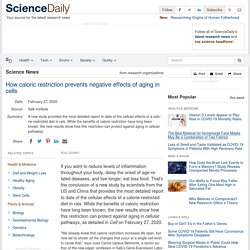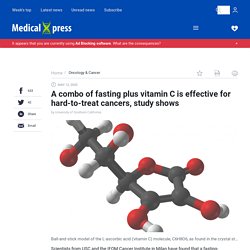

Vitamin C and fasting-mimicking diet can shrink tumors. A combination of very high intravenous doses of vitamin C and a diet that mimics fasting may be an effective way to treat an aggressive type of cancer, a study in mice suggests.

Unlike most cancer therapies, it is unlikely to be toxic for healthy tissue. In the 1970s, when the Nobel prizewinning chemist Linus Pauling first proposed that high doses of intravenous vitamin C could treat cancer, people dismissed his idea as quackery. YouTube. How caloric restriction prevents negative effects of aging in cells. If you want to reduce levels of inflammation throughout your body, delay the onset of age-related diseases, and live longer, eat less food.

That's the conclusion of a new study by scientists from the US and China that provides the most detailed report to date of the cellular effects of a calorie-restricted diet in rats. While the benefits of caloric restriction have long been known, the new results show how this restriction can protect against aging in cellular pathways, as detailed in Cell on February 27, 2020. "We already knew that calorie restriction increases life span, but now we've shown all the changes that occur at a single-cell level to cause that," says Juan Carlos Izpisua Belmonte, a senior author of the new paper, professor in Salk's Gene Expression Laboratory and holder of the Roger Guillemin Chair.
"This gives us targets that we may eventually be able to act on with drugs to treat aging in humans. " A combo of fasting plus vitamin C is effective for hard-to-treat cancers, study shows. Scientists from USC and the IFOM Cancer Institute in Milan have found that a fasting-mimicking diet could be more effective at treating some types of cancer when combined with vitamin C.

In studies on mice, researchers found that the combination delayed tumor progression in multiple mouse models of colorectal cancer; in some mice, it caused disease regression. The results were published in the journal Nature Communications. "For the first time, we have demonstrated how a completely non-toxic intervention can effectively treat an aggressive cancer," said Valter Longo, the study senior author and the director of the USC Longevity Institute at the USC Leonard Davis School of Gerontology and professor of biological sciences at the USC Dornsife College of Letters, Arts and Sciences.
Aging and diet lead to proteome changes in the intestinal epithelium. The small intestine is one of the most important interfaces between the environment and our body.

It is responsible for nutrient absorption but also forms a barrier against potentially harmful environmental cues. A research team, led by researchers from the Leibniz Institute on Aging—Fritz Lipmann Institute (FLI) in Jena, Germany, investigated the effects of aging and diet on the intestinal epithelium of young and old mice. They were able to show region-specific effects on the proteome and age-related impairments in adaptation to nutrient availability. Their results provide a complete picture of the spatial organization of the small intestine proteome in the mouse. The results were published in the journal Cell Reports. The small intestine (SI) is one of the most important interfaces between the environment and our body. Effects of aging and diet on the small intestine have already been investigated.
Diet that mimics fasting appears to slow aging. Want to lose abdominal fat, get smarter and live longer?

New research led by USC's Valter Longo shows that periodically adopting a diet that mimics the effects of fasting may yield a wide range of health benefits. In a new study, Longo and his colleagues show that cycles of a four-day low-calorie diet that mimics fasting (FMD) cut visceral belly fat and elevated the number of progenitor and stem cells in several organs of old mice—including the brain, where it boosted neural regeneration and improved learning and memory. The mouse tests were part of a three-tiered study on periodic fasting's effects—testing yeast, mice and humans—set to be published by Cell Metabolism on June 18.
Mice, which have relatively short life spans, provided details about fasting's lifelong effects. Yeast, which are simpler organisms, allowed Longo to uncover the biological mechanisms that fasting triggers at a cellular level. More information:Cell Metabolism, Brandhorst and Choi et al. Fasting-like diet reduces multiple sclerosis symptoms. Evidence is mounting that a diet mimicking the effects of fasting has health benefits beyond weight loss, with a new USC-led study indicating that it may reduce symptoms of multiple sclerosis.

Scientists discovered that the diet triggers a death-and-life process for cells that appears critical for the body's repair. "During the fasting-mimicking diet, cortisone is produced and that initiates a killing of autoimmune cells," said Valter Longo, the study's lead author and professor who directs the USC Longevity Institute at the Davis School of Gerontology. "This process also leads to the production of new healthy cells. " The new study, published in the journal Cell Reports, included mice and human patients who have multiple sclerosis. The neurological disease affects an estimated 350,000 Americans, according to the National Institute of Neurological Disorders and Stroke. Study details They also saw improvements in the white blood "T cells," responsible for immunity. Scientifically-designed fasting diet lowers risks for major diseases. What if you could lose weight and reduce your risk of life-threatening disease without any changes in what you eat—other than a five-day special diet once every few months?

That's what happened for 71 adults who were placed on three cycles of a low-calorie, "fasting-mimicking" diet. The phase II trial, conducted by researchers at the USC Leonard Davis School of Gerontology, demonstrated a host of benefits from the regimen. The diet reduced cardiovascular risk factors including blood pressure, signs of inflammation (measured by C-reactive protein levels), as well as fasting glucose and reduced levels of IGF-1, a hormone that affects metabolism.
It also shrank waistlines and resulted in weight loss, both in total body fat and trunk fat, but not in muscle mass. In effect, the diet reduced the study participants' risks for cancer, diabetes, heart disease and other age-related diseases, according to the findings published Feb. 15 in Science Translational Medicine. Fasting-mimicking diet may reverse diabetes. A diet designed to imitate the effects of fasting appears to reverse diabetes by reprogramming cells, a new USC-led study shows.

Fasting-mimicking diet holds promise for treating people with inflammatory bowel disease. What if a special diet could reduce inflammation and repair your gut?

USC researchers provided evidence that a low-calorie "fasting-mimicking" diet has the potential to do just that. Published in the March 5 edition of Cell Reports, the study reports on the health benefits of periodic cycles of the diet for people with inflammation and indicated that the diet reversed inflammatory bowel disease (IBD) pathology in mice.
Could diets that mimic fasting improve people's immune systems? Professor Valter Longo, director of the USC Longevity Institute, is investigating how fasting and diets that mimic fasting's effects can help immune function, including vaccine efficacy and the body's response to infection by viruses such as influenza and eventually COVID-19.

Fasting and fasting mimicking diets appear to "get rid of damaged or misguided cells and replace them with younger and more effective immune cells," he says, improving many signs of health in mice. The Longo laboratory is demonstrating that cycles of fasting or fasting-mimicking diets, followed by refeeding a normal diet, promote stem cell-dependent rejuvenation of the immune system in old mice.
Early clinical trials show this process of "cleaning up" older white blood cells during short periods of fasting, then spurring the restoration of the normal levels of the infection-fighting cells when fasting stops, may also happen in humans, providing potential health benefits. This document is subject to copyright. Fasting: Health benefits and risks. Fasting is commonly associated with the month of Ramadan. As you read this, billions of Muslims around the world are engaging in this declaration of faith that involves abstaining from food and drink from dawn until dusk.
While fasting for Ramadan is down to spiritual beliefs, many of us choose to fast with the belief that it benefits our health. But does it? In recent years, numerous studies have suggested that intermittent fasting – abstaining or reducing food and drink intake periodically – can be good for us, making it one of the most popular diet trends worldwide. Mayo Clinic minute: Intermittent fasting facts. Intermittent fasting is cutting yourself off from any food or beverages, other than water, for a certain amount of time.
Some fasting is for religious reasons, while others fast for weight loss. But is it a healthy way to lose weight? "We're hearing a lot more about intermittent fasting, and it essentially means the voluntary abstinence of food or beverage for a prolonged period of time," says Mikel Bryant, a Mayo Clinic dietitian. Bryant says, while fasting can be a tool that helps some people with weight loss, "it's not necessarily the entire answer to everybody's problem. Our body needs a given amount of nutrients every day. " Denying your body of calories for an extended period of time isn't recommended for anyone who's physically active, pregnant, under 18 or has certain medical conditions, such as diabetes.
"So, bottom line, fasting may not be for everyone," Bryant says. Is intermittent fasting a quick fix? One of the latest diet trends is intermittent fasting. There are two common approaches to fasting. One is to eat few calories on certain days and then eat normally the rest of the time. The other involves eating only during certain hours and skipping meals for the rest of each day. In this Mayo Clinic Minute, Dr. Donald Hensrud, director of the Mayo Clinic Healthy Living Program, explains the potential benefits and risks to intermittent fasting. When it comes to cutting yourself off from food for a certain amount of time, Dr. How intermittent fasting changes liver enzymes and helps prevent disease. Researchers in Australia have used state-of-the-art analytical tools to understand how intermittent fasting works on the liver to help prevent disease. The findings will help medical scientists working in cancer, cardiovascular and diabetes research develop new interventions to lower disease risk and discover the optimum intervals for fasting.
In experiments with mice, researchers led by Dr. Mark Larance at the University of Sydney identified how every-other-day fasting affected proteins in the liver, showing unexpected impact on fatty acid metabolism and the surprising role played by a master regulator protein that controls many biological pathways in the liver and other organs. Intermittent fasting can help ease metabolic syndrome. For those with metabolic syndrome, the necessary lifestyle and weight changes can be challenging. Now, a study has shown that eating within a certain time window can help tackle that. Share on Pinterest Metabolic syndrome is an umbrella term for a number of risk factors for serious conditions, such as diabetes, heart disease, and stroke. These risk factors include obesity and high blood pressure, among others.
This is no small issue in the United States, where one-third of adults have metabolic syndrome. Obesity is also prevalent, affecting around 39.8% of adults in the U.S. How you can be overfat without being overweight. (HealthDay)—You know that you need to watch your weight to lower your risk for heart disease, but that is far from the whole story. It is possible to be overfat without being overweight, meaning that you're storing fat within your body even though the scale says you're at a normal weight. And that distinction is key when it comes to heart health. Goodbye, stressful diets? Intermittent fasting offers health benefits, study says. But it's not for everybody. Intermittent fasting: the best method. Intermittent fasting: live 'fast,' live longer? For many people, the New Year is a time to adopt new habits as a renewed commitment to personal health. Newly enthusiastic fitness buffs pack into gyms and grocery stores are filled with shoppers eager to try out new diets.
But, does scientific evidence support the claims made for these diets? In a review article published in the Dec. 26 issue of The New England Journal of Medicine, Johns Hopkins Medicine neuroscientist Mark Mattson, Ph.D., concludes that intermittent fasting does. Eating only during a 10-hour window improved health for those with metabolic syndrome.
Intermittent fasting: the best method. Clinical trial shows alternate-day fasting a safe alternative to caloric restriction. Intermittent fasting: 'Fast and feast' diet works for weight loss. Researchers discover that fasting reduces inflammation and improves chronic inflammatory diseases. Fasting regimens have gained public and scientific interest in recent years, but fasting shouldn't be dismissed as a fad. In a study published in Cell, Mount Sinai researchers found that fasting reduces inflammation and improves chronic inflammatory diseases without affecting the immune system's response to acute infections. While acute inflammation is a normal immune process that helps fight off infections, chronic inflammation can have serious consequences for health, including heart disease, diabetes, cancer, multiple sclerosis, and inflammatory bowel diseases.
"Caloric restriction is known to improve inflammatory and autoimmune diseases, but the mechanisms by which reduced caloric intake controls inflammation have been poorly understood," said senior author Miriam Merad, MD, Ph.D., Director of the Precision Immunology Institute at the Icahn School of Medicine at Mount Sinai. Working with human and mouse immune cells, Dr. How a dietary change might boost cancer therapy. Prospective Association Between Late Evening Food Consumption and Risk of Prediabetes and Diabetes. We have detected that you are using an Ad Blocker. PracticeUpdate is free to end users but we rely on advertising to fund our site.
Please consider supporting PracticeUpdate by whitelisting us in your ad blocker. We have sent a message to the email address you have provided, . If this email is not correct, please update your settings with your correct address. The email address you provided during registration, , does not appear to be valid. Please provide your AHPRA Number to ensure that you are given the correct level of access to our site. Explore. Intermittierendes Fasten bei kardiovaskulären Erkrankungen - ein Überblick.
1. Der Einfluss von Essenshäufigkeit und Timing auf die Gesundheit beim Menschen: Die Rolle des Fastens. ᐅ Autophagie - Diese 5 Dinge aktivieren die Zellreinigung! Abnehmen mit Autophagie: So funktioniert's. Fasten und Kaffeetrinken verlangsamen das Altern und halten gesund. Mein ORF Beitrag: Intervallfasten und Autophagie - Ernährungsberatung und Kinesiologie - Mag. Margit Fensl. Intermittent fasting could help tackle diabetes – here's the science. Autophagie - Entschlackung der Zellen - Gesund durch Heilfasten - Entschlacken & Entgiften.